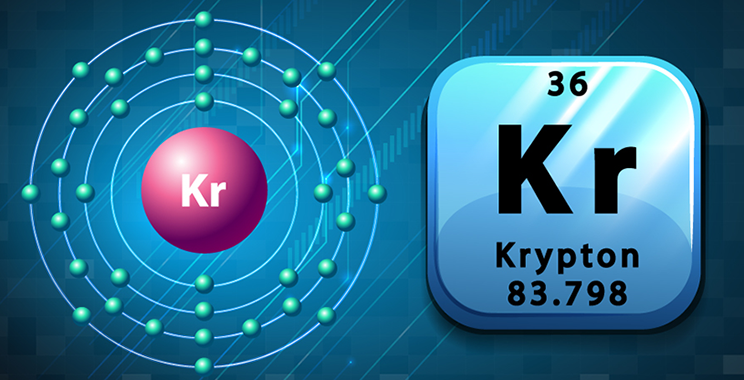
I’m a real element that has a fictional counterpart. What atom am I?
Krypton is an inert (or “noble”) gas and, as such, is not bound up in molecules but exists as single atoms.1 It is the fourth atom in group 18 of the periodic table of elements, after helium, neon, and argon. Its concentration in Earth’s atmosphere is ≈1 ppm by volume.
In 1898, British chemists William Ramsay and Morris Travers discovered krypton as the residue of evaporating almost all of the other components of liquid air. For his work in the discovery of several inert gases, Ramsay was awarded the Nobel Prize in Chemistry in 1904.
Like all inert gases, the boiling and melting points of krypton are only a few degrees apart (see “fast facts”). Krypton has few practical applications, mostly in bright white light bulbs used in photography and in devices used in physical and chemical research. At one time, the wavelength of light emitted by the 86Kr isotope was used to define the meter, but in 1983, the meter’s definition was changed to a function of the speed of light.
In comic books dating back to 1949, “Krypton” was the planet where Superman was born; and “kryptonite” was the only substance that the superhero was vulnerable to. Over the years, the mythological kryptonite was endowed with much more extensive chemistry than real krypton gas.
1. Although there are exceptions, such as former Molecule of the Week krypton difluoride.
Krypton hazard information
| GHS classification*: not a hazardous substance or mixture |
*Globally Harmonized System of Classification and Labeling of Chemicals.
**Krypton, like all inert gases, is nonhazardous at atmospheric pressure. But when it is contained under pressure, it may explode when heated; and if it is released into a closed space, it may displace air, leading to suffocation.
Krypton fast facts
| CAS Reg. No. | 7439-90-9 |
| Empirical formula | Kr |
| Molar mass | 83.80 |
| Appearance | Colorless gas |
| Boiling point | –153.4 ºC |
| Melting point | –157.4 ºC |
| Water solubility | ≈7 x 10–5 mL/L or ≈3 x 10–7 mg/L |

Learn more about this molecule from CAS, the most authoritative and comprehensive source for chemical information.
Molecule of the Week needs your suggestions!
If your favorite molecule is not in our archive, please send us a message. The molecule can be notable for its current or historical importance or for any quirky reason. Thank you!
Stay Ahead of the Chemistry Curve
Learn how ACS can help you stay ahead in the world of chemistry.

